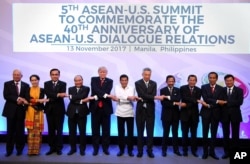China's agreement with 10 Southeast Asian nations to start substantive talks on a code of conduct for a disputed sea shows a new level of trust among governments that stood divided just over a year ago.
Leaders from Beijing and the Association of Southeast Asian Nations (ASEAN) agreed Monday in Manila to kick off talks that will convert a framework code of conduct into a real set of rules for avoiding accidents on the South China Sea.
Four Southeast Asian nations as well as Taiwan vie with Chinese claims to the crowded sea that’s prized for fisheries, fossil fuels and commercial shipping lanes. China claims about 90 percent of it. It has upset the others since 2010 by building artificial islets for occupation and militarizing some.
Reversal of hostilities
In mid-2016 China lost world court arbitration to the Philippines over the legal basis for its maritime claims after it had occupied a shoal coveted by Filipino fishing boats. Since then China has stepped up talks around Southeast Asia to work things out, though it rejects the arbitral ruling.
Southeast Asian nations, all militarily weaker than China and some lagging Chinese economic development, have accepted Chinese aid and investment since then.
“On the one hand, China is being watched very suspiciously for its moves on the South China Sea and whole host of other territorial disputes, its military modernization which has taken up tempo by the current president Xi Jinping, all these unnerve ASEAN, but on the other hand they cannot do without Chinese investment,” said Alan Chong, associate professor at the S. Rajaratnam School of International Studies in Singapore.
Code of conduct talks
In August China and the association established the framework code, which will be aimed at preventing accidents in the 3.5 million-square-kilometer sea without touching on sovereignty questions. The formal code would guide vessels from different countries in avoiding deadly confrontations such as Sino-Vietnam clashes in 1974 and 1988.
China had stalled progress on that code, which was born out of a declaration in 2002, for about six years, analysts believe.
Beijing’s maritime claims overlap the exclusive economic zones of Brunei, Malaysia, Vietnam and the Philippines. Its increasing control over that claim, which China bases on documents showing historical use, had caught worldwide attention, including from outside powers such as Japan and the United States.
After a series of senior-level ASEAN summits Monday and Tuesday, U.S. President Donald Trump said he was still concerned about "China's efforts to build and militarize outposts in the South China Sea.”
Japanese Prime Minister Shinzo Abe told a news conference in Manila his government wanted to lock in a “rules-based” maritime order that would benefit of every country that uses the South China Sea.
Military buildup, then reassurances
China has reclaimed land to build up at least seven tiny maritime features, some for military infrastructure that could berth radar systems and combat aircraft, the Asia Maritime Transparency Institute under American think tank Center for Strategic and International Studies says.
It further irks the Southeast Asian states by passing coast guard vessels through their exclusive economic zones.
But when a senior Chinese official asked Philippine President Rodrigo Dutere whether he was worried about loss of life at sea and he said yes, China gave its nod to the code of conduct, the Philippine leader told a news conference Tuesday.
“China reassured the Philippine president they would not resort to the use of military force and that they would not block freedom of navigation in the South China Sea,” Duterte’s spokesman Harry Roque told a news conference Monday.
A code of conduct brings in more countries than the 2016 world court arbitration between just Beijing and Manila, Duterte said Tuesday.
China and ASEAN said in a statement Monday they also approved a declaration for a "decade of marine environmental protection" of the same sea, where stocks face depletion due to overfishing.
Duterte still weathers criticism at home as well as overseas for not standing up for the world court arbitration, which would have bolstered Philippine maritime claims off the fishing-reliant archipelago’s west coasts.
China pledged $24 billion in aid and investment to the Philippines in October 2016 as Duterte sought to mend relations.
“Philippines President Rodrigo Duterte still appears willing to defer to Beijing on maritime issues,” said Sean King, vice president of the Park Strategies consultancy in New York. “It all seems like a slow burn in mainland China’s favor as Beijing further fortifies disputed features in the disputed South China Sea.”
Experts say negotiators could take years to finalize code of conduct, especially if political ties sour in the process.







